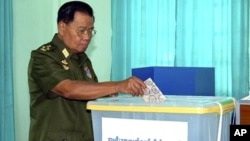A party allied with Burma's military appears to have captured most of the seats in national elections. But the largest pro-democracy parties and rights groups accused the military government of openly manipulating the vote.
Burma's pro-democracy parties conceded defeat Tuesday after the largest pro-military party, the Union Solidarity and Development Party, said it had won up to 80 percent of the parliament seats being contested.
The National Democratic Force and the Democratic Party both said they had lost Sunday's election.
On Tuesday at least six parties lodged complaints with the election commission, claiming state workers were forced to vote for the pro-military parties.
Cheery Zahau, a coordinator with the Human Rights Education Institute of Burma, says the group's research supported the allegations.
"USDP really forcing people to join the party and once they join the party they tell the people they must vote for the party or otherwise their [rights] will be taken away, they will lose their job and they will face problems … they will be forgotten basically in the society, in the community," Zahau said.
Rights groups, Burmese democracy activists and much of the world have dismissed the election as a sham because of campaign laws that hampered opposition candidates.
The military government, however, says the election, the first in 20 years, is part of a plan to create a civilian government after nearly 50 years of army rule.
Under the 2008 constitution a quarter of the parliament seats were set aside for the armed forces, even before the election.
Human Rights Watch spokesman Sunai Pasuk says the outcome is unlikely to improve Burma's political and economic climate.
"It doesn't matter what the result will become, " Sunai said, "no matter how big the margin of the victory that the military backed party will achieve, this election is a sham from the beginning. It is not even a real electoral contest. It doesn't matter how many votes the military backed party has gained it will not lead to any improvement in the situation in Burma."
But Chulalongkorn political science professor Thitinan Pongsudirak says while the election was flawed, it could open the way for new political voices.
"These elections may provide yet in the medium-term going forward some movement, some new dynamics that could lead to some kind of opening," Thitinan said. "It's unlikely to be a full-fledged democracy like many people hope but some change. The last 20 years of a classic military regime, dictatorship, we have to hold out a little bit of hope."
The National League for Democracy won the last election in 1990. But it was never allowed to take power, and some of its leaders, including Aung San Suu Kyi, have spent most of the years since under arrest.
The results come as clashes along Burma's border with Thailand between ethnic militia and the army appeared to die down. Fighting Sunday and Monday in the Burmese town of Myawaddy forced thousands of Burmese to flee into Thailand seeking temporary shelter. But Tuesday evening, most were heading home after the Thai government said it was safe.
Pro-Military Party Claims Almost 80 Percent of Votes in Burma Election
















